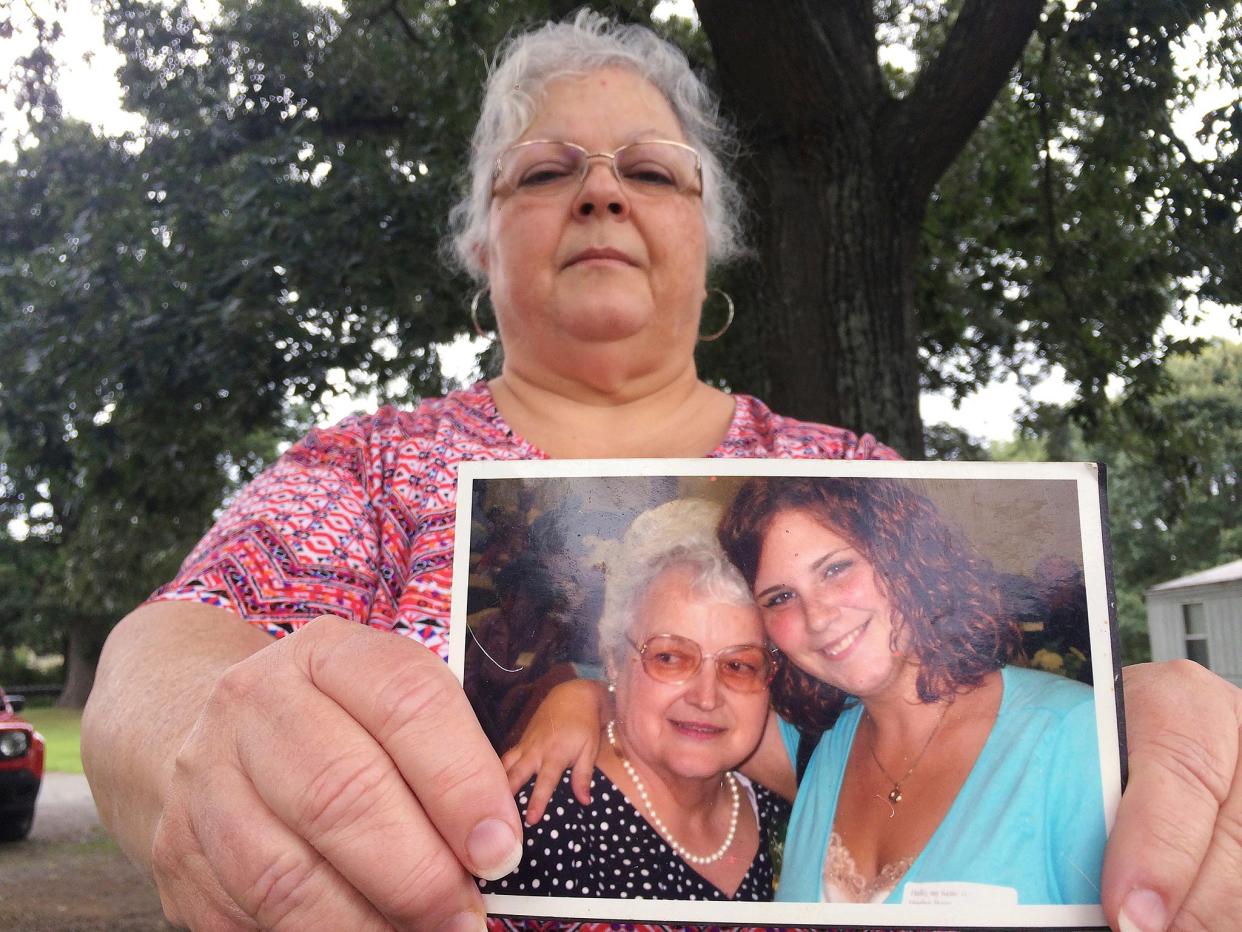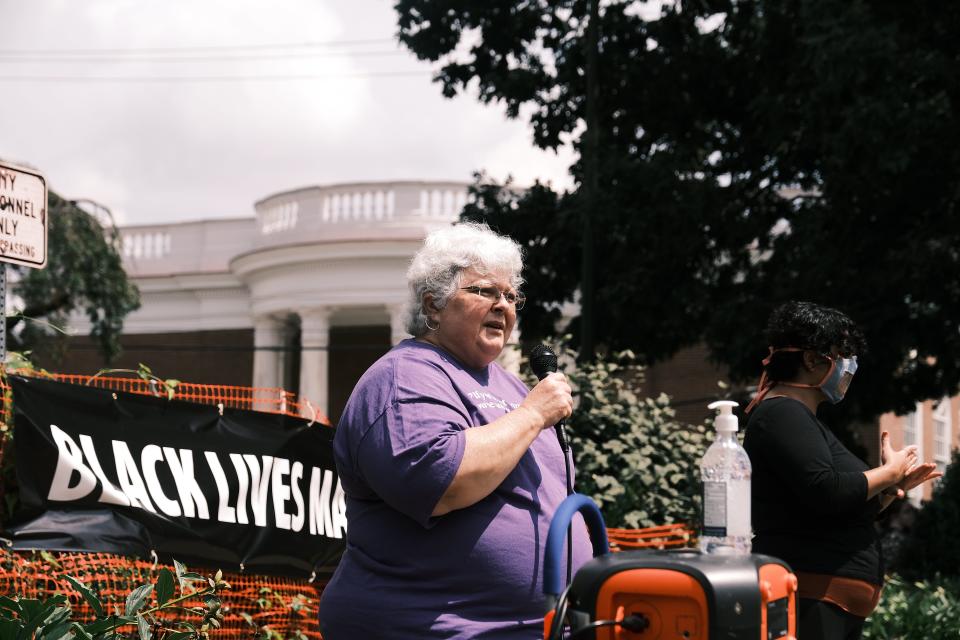‘She marched for Black lives’: Heather Heyer’s mother Susan Bro and the fight for justice beyond Charlottesville
- Oops!Something went wrong.Please try again later.

Last year on 12 August, three years after her 32-year-old daughter was murdered, Susan Bro reflected on the waves of grief and pain that followed, offering guidance for a nation which by then had seen more than 160,000 people die from coronavirus.
“It is common to the human experience to lose a loved one, and knowing I am not alone gives me comfort,” she wrote in a column in Fortune. “Waves crash over or lap gently from time to time, and the tears fall. But I keep looking ahead. I have work to do. I have a purpose for being here, and I choose to survive.”
Ms Bro’s daughter – antiracist activist Heather Heyer – was murdered on 12 August, 2017 when a white supremacist accelerated his car into a crowd of counter-protesters at a far-right rally in Charlottesville, Virginia. He killed Ms Heyer and injured 35 others.
James Alex Fields Jr, 22, was convicted of first-degree murder and pleaded guilty to 29 of 30 federal hate crime charges. He was sentenced to life in prison in 2019. A civil trial against the far-right rally organisers is scheduled to begin in Charlottesville this October.
Following her death, Ms Bro endured a flood of press attention; as she does today, she faced it directly, remaining forthright and engaged, and with compassion and humor, across countless public appearances and press interviews, careful to steer their attention from her daughter’s murder to the nation’s legacy of pervasive racist violence, white supremacy and systemic injustice, from policing to public health.
She established the Heather Heyer Foundation, which provides scholarships to students dedicated to progressive social change, and agreed to lend her daughter’s name to a hate crime law that President Joe Biden signed in front of her.
“I’ve gotten an unfair advantage, privilege, whatever word you want to use, as the mother of white girl who was killed in a hate crime because I’ve had all this press and attention for the past four years,” she told The Independent.
“So what I’m doing is using it to bring attention to others who don’t have that platform and giving them a platform, handing the mic, and bringing attention to their issues as well,” she said. “Heather got justice, but a lot of mothers don’t.”
After Charlottesville, where the “Unite the Right” rally four years ago sought to protest the removal of a statue to Confederate General Robert E Lee, activists, city and state officials have removed similar monuments across the US. Charlottesville’s statues to Lee and Confederate General Thomas “Stonewall” Jackson were removed from their pedestals last month.
I see a lot more interest in people wanting me to come talk to them about white privilege. I say that’s fine, but I will only come if the next person to come behind me [tells] them what they can do about it
Susan Bro
The removal of the nation’s Confederate statues – part of a decades-long effort to dismantle monuments to advance the Lost Cause narrative in the Civil War’s Jim Crow-era aftermath – was revived by 2020’s international demonstrations following the police killings of George Floyd and Breonna Taylor, among other Black Americans.
“Heather didn’t march for statues. She marched for Black lives,” Ms Bro said during a video call from her home in Virginia. “Am I glad they’re gone? Yes, I thought they should never have been put up in the first place.”
In a video released on 25 April 2019, Joe Biden announced his presidential campaign, invoking the white supremacist march and violence in Charlottesville, where he said a “brave young woman” was killed.
“He did not check with me first, which is fine, because Heather’s story is a very public story, it’s not a private story,” Ms Bro said. “The first I knew he had used her name in Charlottesville in the announcement was a reporter who reached out to me at 7 in the morning, and asked how did I feel about it. I said … ‘I honestly don’t know because I do not know what happened yet. Let me have some coffee and I’ll call you back.’”
That afternoon, the president called the former school teacher after she left the foundation’s office.
“We talked for a good bit, and I said, ‘I don’t mind you using her name as long as you make some good of it, not just speak it,’” she said.
During a bill signing ceremony at the White House on 20 May, the president said: “Susan, progress is possible. We’re moving.”
Seated behind Second Gentleman Doug Emhoff and Attorney General Merrick Garland was Ms Bro.
“I was so nervous about being there I didn’t even register he was talking to me, because Susan Collins was behind me,” she said.
The president signed the Covid-19 Hate Crimes Act, which included provisions from the Jabara-Heyer NO HATE Act, aimed at collecting more accurate hate crime data and helping victims report them. The measure is named after Ms Heyer and Khalid Jabara, whose murderers were prosecuted for hate crimes but not reported in hate crime statistics.
The NO HATE Act provides federal grants for state and local governments to improve hate crime data collection into the National Incident-Based Reporting System and establish hotlines for victims to report them.
It also requires people convicted under the Matthew Shepard and James Byrd Jr Hate Crimes Prevention Act – which expands federal hate crime laws to include LGBT+ and disability protections – to participate in educational programmes or community service as a condition of supervised release.
“I said, ‘OK, I will lend my voice and my daughter’s name in that case because otherwise we certainly don’t need her name on anything else,’” Ms Bro said.
Heather Heyer worked full time as a paralegal at a bankruptcy firm, and worked part time as a bartender, a server, or for a food-delivery service. Her activism was in talking to people in small groups or one-on-one, or on social media, Ms Bro said.
“If she talked with you face to face, she would start out gently – ‘can you talk to me about why you believe in what you believe, what are you basing this on, why do you feel this way’ – and she would try to gently tug you along,” she said.
“I don’t know how she would be if you insisted on being bullheaded,” she added. “That was her style of activism: Plant the seed and hope it brought fruit forward.”

After widespread uprisings demanding accountability for police violence, federal police reform legislation to be named after Mr Floyd has languished in Congress.
Meanwhile, Republican state lawmakers have advanced so-called “anti-riot” legislation to criminalise dissent or provide civil or criminal immunity to drivers who hit demonstrators with their cars.
Similar bills were passed in Florida, Oklahoma and Iowa. Legislation in Indiana barred residents from holding state employment if they’re convicted of unlawful assembly. A Minnesota bill prohibits them from receiving student loans, unemployment benefits or housing assistance.
Under Florida’s sweeping “anti-riot” law, a public gathering of three or more people can be classified as a “riot,” and anyone who “willingly” participates can be charged with a felony.
Ms Bro told Democracy Now that such laws amount to “open season” on protesters in the wake of massive protests against police violence in 2020.
“‘We don’t like what you’re saying so you’re therefore a ‘criminal’ – that’s not exactly American,” she told The Independent. “Suddenly we’re allowing and encouraging all the same things we have decried in so many countries – control of women’s bodies, control of whether or not you protest, control of the media.”
A bipartisan group of congressional lawmakers has stalled on negotiations for a George Floyd Justice in Policing Act, which the president demanded Congress pass by the anniversary of his death on 25 May. Nearly three months later, its prospects are unclear.
A House-passed version of the bill would change the threshold for permitting use of force, prohibit police chokeholds at the federal level, ban no-knock warrants in federal drug cases, and create a national registry of police misconduct cases under the auspices of the Justice Department, among other reforms.
It also would overhaul “qualified immunity” policies, which can shield officers from civil lawsuits and make it easier to prosecute police for killing people or engaging in misconduct – which Republicans have rejected.
“In talking about how to get past some of this legislation, we need to find out what’s causing the holdups,” Ms Bro said. “What are people’s fears about this? What are the consequences they fear? If police and unity is the key issue, let’s look at the good and bad of that. … Who are they healthy for? The community or the police?”
Asked whether she finds a kind of comfort in telling her daughter’s story to advance racial justice, Ms Bro clarifies that “there is no closure with this”.
“Part of me is hopeful, because we at least get these brief rises in public attention. Prior to Heather’s murder, there would be very brief outcries, and they would kind of go away,” she said. “Unfortunately, as always happens, the energy has kind of died off again, we still don’t have the George Floyd bill signed, we still have people actively opposing it.”
Police have killed more than 500 people in the US in the first half of 2021, holding a steady pattern of police violence that saw 1,020 police killings in 2020, according to an analysis from The Washington Post.
“I see a lot more interest in people wanting me to come talk to them about white privilege. I say that’s fine, but I will only come if the next person to come behind me [tells] them what they can do about it,” she said.
“We’ve become very aware – we’ve read a lot of books, we’ve read a lot of articles, we’ve gathered all sorts of information – but we’ve let it sit in our brains and not put it in our feet,” she continued. “I’m hoping to move the needle forward.”
Read More
What masks are best for Delta variant?
Popular New York beach closed to swimmers over shark sightings

